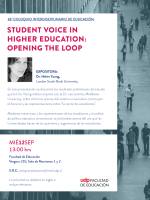Student Voice in Higher Education: Opening the Loop
Conference presentation
Young, H (2018). Student Voice in Higher Education: Opening the Loop. 38' Coloquio Interdisciplinario de Educación. Universidad Diego Portales, Santiago, Chile 12 Sep 2018
| Authors | Young, H |
|---|---|
| Type | Conference presentation |
| Abstract | This qualitative research study draws on interviews with |
| Year | 2018 |
| Accepted author manuscript | License File Access Level Open |
| Publication dates | |
| 12 Sep 2018 | |
| Publication process dates | |
| Deposited | 14 Jun 2019 |
| Accepted | 12 Aug 2018 |
| Supplemental file | License |
https://openresearch.lsbu.ac.uk/item/86968
Download files
Accepted author manuscript
| Helen Young Presentation - Handout.pdf | ||
| License: CC BY 4.0 | ||
| File access level: Open | ||
193
total views381
total downloads4
views this month2
downloads this month
